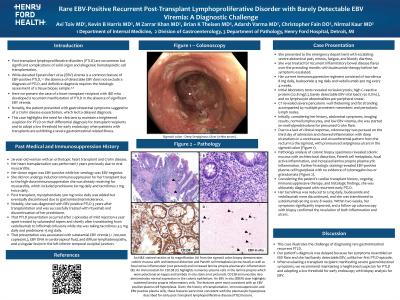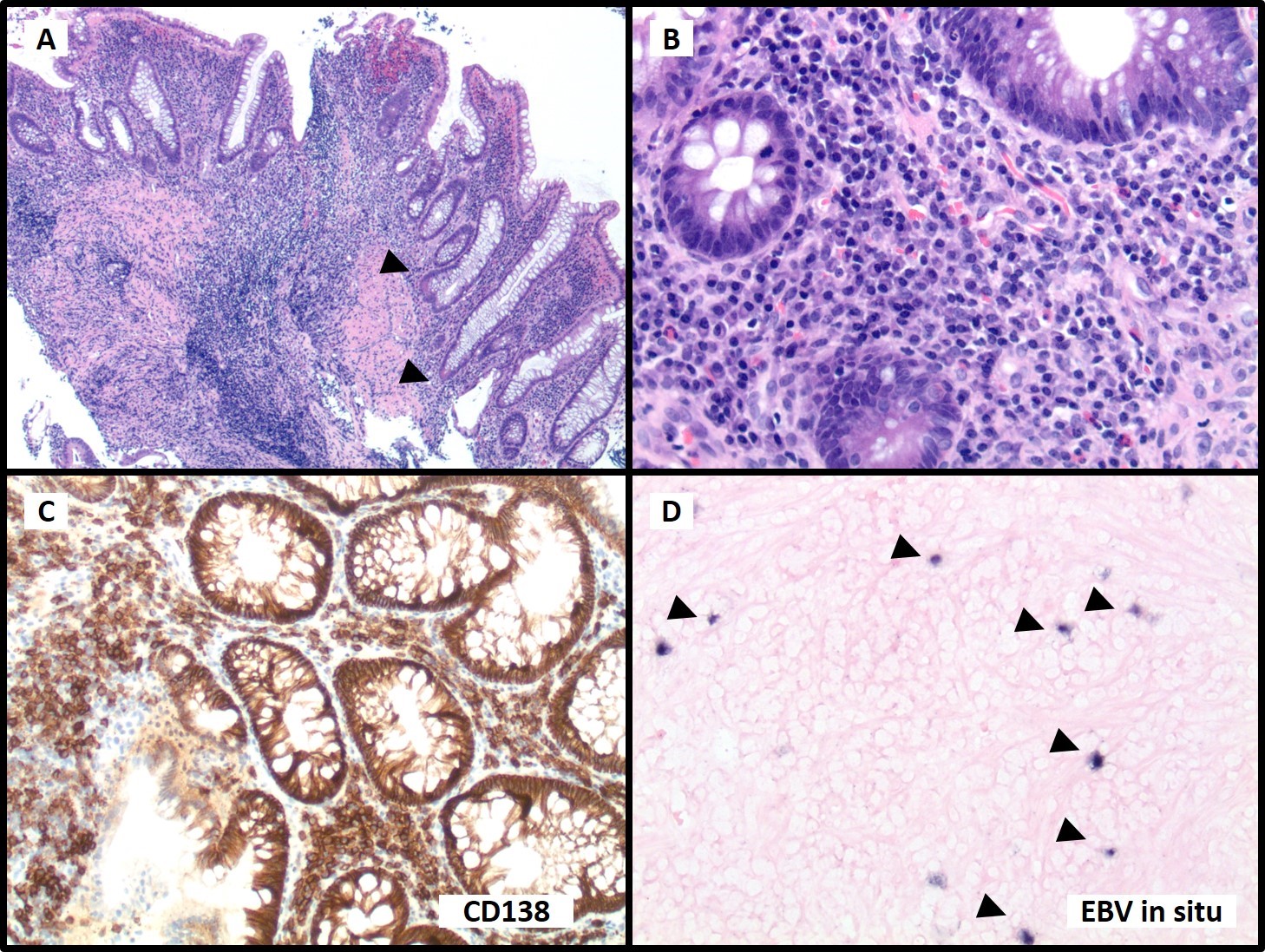Monday Poster Session
Category: Colon
P1972 - Rare EBV-Positive Recurrent Post-Transplant Lymphoproliferative Disorder With Barely Detectable EBV Viremia: A Diagnostic Challenge
Monday, October 28, 2024
10:30 AM - 4:00 PM ET
Location: Exhibit Hall E

Has Audio

Avi Toiv, MD
Henry Ford Hospital
Detroit, MI
Presenting Author(s)
Avi Toiv, MD1, Kevin Harris, MD1, Muhammad Zarrar Khan, MD2, Brian K. Theisen, MD1, Adarsh K. Varma, MD3, Christopher Fain, DO3, Nirmal Kaur, MD1
1Henry Ford Hospital, Detroit, MI; 2Henry Ford Hospital, Royal Oak, MI; 3Henry Ford Health, Detroit, MI
Introduction: Post-transplant lymphoproliferative disorders (PTLD) are complications arising from post-transplantation immunosuppressive therapy. Epstein-Barr virus (EBV) viremia is often seen in PTLD, but it is not a diagnostic feature. We report a rare case of recurrent PTLD in a transplant recipient who had high EBV viremia in her first PTLD episode, however, her recurrent episode had barely detectable EBV viremia, delaying diagnosis.
Case Description/Methods: A 26-year-old woman with a heart transplant (EBV donor+/recipient-) and Crohn disease presented to the emergency department with severe abdominal pain and bloody diarrhea. Her heart transplantation was 7 years previously and she was maintained on high-dose immunosuppression. Notably, she had been diagnosed with EBV-positive PTLD 4 years previously and successfully treated with rituximab. That PTLD presentation was diagnosed with substantial EBV viremia ( > 700,000 copies/mL). At this presentation, she had been treated for recurrent inflammatory bowel disease (IBD) flares over the preceding months before her symptoms escalated. Initial laboratory tests revealed high C-reactive protein, low EBV viral load below 50 IU/mL, and no lymphocyte abnormalities on peripheral smear. CT abdomen revealed severe pancolonic wall thickening and fat stranding, with multiple prominent pericolonic lymph nodes. She was started on methylprednisolone for presumed IBD flare. Due to a lack of clinical response, colonoscopy was pursued on day 3 of admission and showed inflammation with deep continuous and circumferential ulcerations from the rectum to the sigmoid, with pronounced serpiginous ulcers in the sigmoid colon. Pathology analysis (figure) of colonic biopsies revealed mucosal architectural distortion, Paneth cell metaplasia, and increased lamina propria plasmacytic inflammation. Further histologic staining revealed EBV-positive plasma cell hyperplasia with no evidence of cytomegalovirus or granulomata supporting a diagnosis of recurrent early PTLD.
Discussion: This case illustrates the challenge of diagnosing rare gastrointestinal recurrent PTLD. Our patient’s diagnosis was delayed because her symptoms resembled an IBD flare and she had barely detectable EBV, unlike her first PTLD episode. When evaluating a transplant recipient manifesting severe gastrointestinal symptoms, we recommend maintaining a heightened suspicion for PTLD and adopting a low threshold for early endoscopy with biopsy analysis for EBV.

Disclosures:
Avi Toiv, MD1, Kevin Harris, MD1, Muhammad Zarrar Khan, MD2, Brian K. Theisen, MD1, Adarsh K. Varma, MD3, Christopher Fain, DO3, Nirmal Kaur, MD1. P1972 - Rare EBV-Positive Recurrent Post-Transplant Lymphoproliferative Disorder With Barely Detectable EBV Viremia: A Diagnostic Challenge, ACG 2024 Annual Scientific Meeting Abstracts. Philadelphia, PA: American College of Gastroenterology.
1Henry Ford Hospital, Detroit, MI; 2Henry Ford Hospital, Royal Oak, MI; 3Henry Ford Health, Detroit, MI
Introduction: Post-transplant lymphoproliferative disorders (PTLD) are complications arising from post-transplantation immunosuppressive therapy. Epstein-Barr virus (EBV) viremia is often seen in PTLD, but it is not a diagnostic feature. We report a rare case of recurrent PTLD in a transplant recipient who had high EBV viremia in her first PTLD episode, however, her recurrent episode had barely detectable EBV viremia, delaying diagnosis.
Case Description/Methods: A 26-year-old woman with a heart transplant (EBV donor+/recipient-) and Crohn disease presented to the emergency department with severe abdominal pain and bloody diarrhea. Her heart transplantation was 7 years previously and she was maintained on high-dose immunosuppression. Notably, she had been diagnosed with EBV-positive PTLD 4 years previously and successfully treated with rituximab. That PTLD presentation was diagnosed with substantial EBV viremia ( > 700,000 copies/mL). At this presentation, she had been treated for recurrent inflammatory bowel disease (IBD) flares over the preceding months before her symptoms escalated. Initial laboratory tests revealed high C-reactive protein, low EBV viral load below 50 IU/mL, and no lymphocyte abnormalities on peripheral smear. CT abdomen revealed severe pancolonic wall thickening and fat stranding, with multiple prominent pericolonic lymph nodes. She was started on methylprednisolone for presumed IBD flare. Due to a lack of clinical response, colonoscopy was pursued on day 3 of admission and showed inflammation with deep continuous and circumferential ulcerations from the rectum to the sigmoid, with pronounced serpiginous ulcers in the sigmoid colon. Pathology analysis (figure) of colonic biopsies revealed mucosal architectural distortion, Paneth cell metaplasia, and increased lamina propria plasmacytic inflammation. Further histologic staining revealed EBV-positive plasma cell hyperplasia with no evidence of cytomegalovirus or granulomata supporting a diagnosis of recurrent early PTLD.
Discussion: This case illustrates the challenge of diagnosing rare gastrointestinal recurrent PTLD. Our patient’s diagnosis was delayed because her symptoms resembled an IBD flare and she had barely detectable EBV, unlike her first PTLD episode. When evaluating a transplant recipient manifesting severe gastrointestinal symptoms, we recommend maintaining a heightened suspicion for PTLD and adopting a low threshold for early endoscopy with biopsy analysis for EBV.

Figure: A hematoxylin and eosin stained section at 4x magnification (A) from the sigmoid colon biopsy showing colonic mucosa with architectural distortion and Paneth cell metaplasia (arrow head) and (B) increased lamina propria plasmacytic inflammation. (C) Immunostaining for CD138 highlights numerous plasma cells in the lamina propria, which were polyclonal per kappa and lambda in situ stains (not pictured). CD138 immunostaining revealed normal expression in the colonic epithelium. (D) An Epstein-Barr virus (EBV) in situ stain highlights scattered lamina propria inflammatory cells (arrow head). The features were most consistent with EBV-positive plasma cell hyperplasia described for early post-transplant lymphoproliferative disorder lesions.
Disclosures:
Avi Toiv indicated no relevant financial relationships.
Kevin Harris indicated no relevant financial relationships.
Muhammad Zarrar Khan indicated no relevant financial relationships.
Brian Theisen indicated no relevant financial relationships.
Adarsh Varma indicated no relevant financial relationships.
Christopher Fain indicated no relevant financial relationships.
Nirmal Kaur indicated no relevant financial relationships.
Avi Toiv, MD1, Kevin Harris, MD1, Muhammad Zarrar Khan, MD2, Brian K. Theisen, MD1, Adarsh K. Varma, MD3, Christopher Fain, DO3, Nirmal Kaur, MD1. P1972 - Rare EBV-Positive Recurrent Post-Transplant Lymphoproliferative Disorder With Barely Detectable EBV Viremia: A Diagnostic Challenge, ACG 2024 Annual Scientific Meeting Abstracts. Philadelphia, PA: American College of Gastroenterology.
